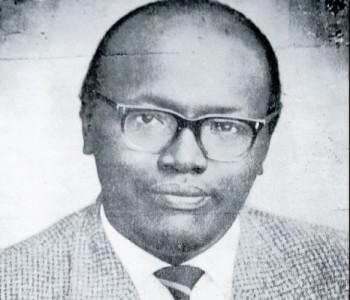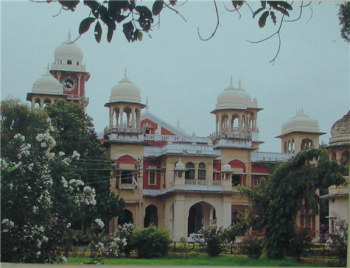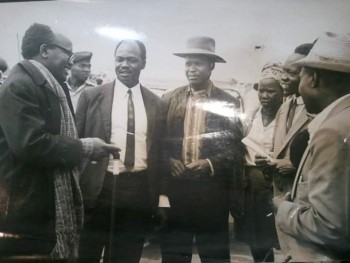Jean-Marie Seroney (1927-82)
An outspoken laywer, trade unionist, and prisoner of conscience

Marie Seroney was born Eric Seroney in 1927 at Kapsabet, present day Nandi County, to Reuben and Leah Seroney, who were inland church members. His father Reuben was a preacher and teacher and was involved in the first translation of the Bible in Kalenjin in the late 1920s. Jean Marie Seroney started school in 1935 before joining government school of Kapsabet in 1938. He schooled with Daniel Arap Moi, who had been adopted by his father Reuben a few months earlier, and was taught by Argwings Kodhek. After he completed his studies in Kapsabet he got a scholarship to from Kapsabet Local Native Council to join Alliance High School from 1941-45.
Global Connections
After completion of his secondary school he proceeded to Makerere in 1945 where he became acquainted with fellow nationalists Julius Nyerere and Edward Mutesa II. This was the first time he had global exposure after stepping out of Kenya. He soon settled and found his niche by joining the drama club which he later became the president as well as being the founder of the political society. He continued to read widely and excelled in English and literature, becoming an independent thinker, a virtue that manifested throughout his life. Later, he became a Catholic to the resentment for his father who was an Anglican preacher, hence changing his name from Eric to Jean Marie Seroney after the Catholic nun, Marie Theresa. This was in line with French Catholic leaders at Makerere.
After completing his diploma, he was not interested in becoming a teacher, to the surprise of colonial government which discouraged other professions, especially law. Therefore, he had to look for a scholarship elsewhere which he did by establishing contacts with Mbiu Koinange, who had already completed his Masters degree in the USA. It was after a couple of applications that he succeeded and was admitted to pursue a Bachelor of Arts at the University of Allahabad in India.

He arrived in India in 1947, shortly after the country’s independence and the chaos that surrounded its partition into India and Pakistan. However, at the university he was inspired by student leader Daft Tiwani, who was previously jailed for his nationalistic activities in colonial India and later became an influential politician. He admired his courage and learnt to express his opinions without fear. He was also influenced by India First Prime Minister Jawaharlal Nehru who gave a speech in Allahabad University shortly after independence where he stressed that the objective after independence included democracy and equality. Seroney graduated in 1949 hence becoming the first Nandi to graduate with a degree and later enrolled for law degree. While in India, he continued his liberation efforts by publishing an article in Indian review in January 1950 entitled “Threat of South African Fascism to East Africa” where he compared the Kenyan white settlers desires to implement the same apartheid policies that were adopted by South Africa minority white rule. After his completion of studies he returned to Kenya where he campaigned with Jomo Kenyatta around Rift Valley for independence during 1951. He was vocal in fighting against racial discrimination that led to poor social services for Africans. The following year he went the UK to pursue higher education in Law; he also addressed a Moral Re-armament conference at Switzerland concerning evils of colonialism. He later acknowledged that the conference made him to interact with people from around the world, including South Africa, America and Germany, hence being exposed to different ideologies that prevailed at the time.
In the UK, he learnt how social welfare worked and had a desire to implement the same policies in Kenya upon his return. In fact, he opened a social hall in Tinderet when he later became an MP and continued to advocate for the general welfare of the people throughout his political life. He returned to Kenya in 1956 where he became a member of the Law Society of Kenya, which had been formed in 1948 with Chanan Singh as the Chair. Seroney’s perception of global cold war politics shows that he was a moderate. In that period he seems to have interacted with either side of the cold war by visiting the United States and USSR. He also advocated the lifting of restrictions on Kenyan students from travelling to socialist countries. Seroney continued his advocacy for liberty and other human causes in Kenya’s second parliament from 1970 onwards. He declared economic development without human rights is not what Kenya had aspired to at independence. In 1971, he was sent by the Kenyan government to the United Nation to address various matters including apartheid policies in South Africa.
Political Life

Seroney became active in politics through trade unions where he was elected the secretary of Kenyan African Civil Servants Association in 1956. This was significant because it is through trade unions that native politicians thrived during the state of emergency, including Tom Mboya and Argwings Kodhek. In that period, he also used his connection with Kenyan media to highlight discrimination polices. He later joined the legislative council under KADU in 1961 for Nandi.
Seroney was part of the KADU delegation to the second Lancaster House conference in 1962. The next year, he joined KANU against the wishes of Daniel Moi and recaptured his legislative council seat in 1969. In subsequent years he became very unpopular among KANU elites for being outspoken against government. For instance, he confronted the Kenyatta regime on land allocation in Rift Valley which he considered biased through the ‘Nandi Declaration’ and freedom of the press. He perceived the allocation of land to other people as discrimination against the Nandi community due to the fact that it was their land that was illegally taken by the white settlers. Therefore, he was not focused on ethnicity but rather on the Nandi community reclaiming the land they lost in the colonial period. This affected his personal relationship with Moi, who was Vice President and Minister for Home Affairs and felt Seroney challenged him as the official leader of Kalenjin community.
Furthermore, Seroney opposed the banning of opposition parties, which he perceived as a one-party dictatorship tendency by KANU. In subsequent months, Moi would use state machinery to terrorize Kenya People’s Union leaders including Jaramogi Oginga. However, Seroney continued to advocate for government accountability. He urged the Kenyan government to release political prisoners in 1974, which showed his principles in terms of freedom of thought. He was also instrumental in proposing measures that would improve the lives of Kenyans, including the National Planning Commission. In 1974, he supported Philomena Chelangat, who became one of the youngest MPs in Kenya at the age of 24, to win Eldoret North. In that period he had fallen out with KANU and was ousted from the chairman seat in Nandi.
In 1975, he was elected deputy speaker despite opposition from the front bench. He got into trouble with government when he supported Martin Shikuku’s assertion that KANU was ‘dead’, leading to his detention in October 1975. He became one of the longest prisoners of conscience in Kenya, without trial, until his release after the death of Jomo Kenyatta by president Moi. He never really recovered economically and politically after his release, hence he became an alcoholic with few contributions in the public arena. He died in 1982, in MP Shah Hospital, at the age of 55 years.
Archives and online sources
Kenya National Archive, Nairobi, Kenya
Macmillan Library, Nairobi, Kenya
Kenyatta University Library, Nairobi Kenya
Daystar University, Athi River
Kenya Parliament Hansard online http://www.parliament.go.ke/the-national-assembly/offices/hansard-department
Jean Marie Seroney, ‘The threat of South African Fascism to East Africa’, The Indian Review, Vol. 51, Jan 1950
East African Standard
Daily Nation
Sunday Nation
The Star
Further reading
Godfrey K. Sang, Just for Today: The Life and Times of Jean-Marie Seroney (Bristol: Dolman Scott Limited, 2015).


